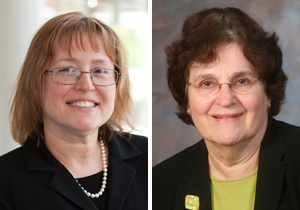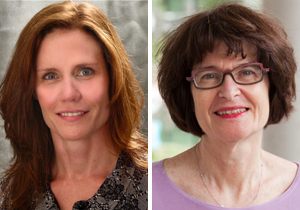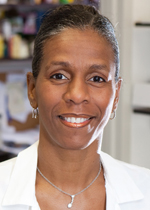

Women in Medicine & Science
Supporting Opportunities for Women in Medicine and Science
Recently, an Atlantic Monthly article detailed the difficulties that still remain for female professionals attempting to "have it all" – powerful leadership roles at work and a fulfilling family life – as the feminist assertion from the 1970s promised women they could.
Like women in other industries, having a rewarding professional career and home life remains challenging for female scientists and physicians. During the past decade, in an attempt to address this issue, the Einstein administration has sought to provide greater support that will allow more women within the College of Medicine to compete for top-level jobs while also juggling a busy personal life.

Dr. Nadine Katz Dr. Susan Band Horwitz"Difficulty with work-life balance is often a reason why women drop out of competition for leadership roles," said Dr. Susan Band Horwitz, one of just two female academic department chairs at Einstein who is distinguished professor and co-chair of molecular pharmacology. "Working as a basic scientist and having a normal life is not easy. Women are still the major care providers for their kids, and medical research is time-consuming and difficult."
She recalled, "When I arrived at Einstein in 1967 as a postdoctoral fellow, I worked three days a week for three years, until my twin sons entered the first grade. Academia needs to be more receptive to parents with young children. One way to do this is to make it more acceptable to maintain a flexible schedule."
Einstein has made strides to do so, also offering a child care program and a special room for nursing mothers in recent years. And the administration continues to seek ways that it can encourage and support women toward achieving leadership roles.
"We’ve opened our eyes to see excellence irrespective of gender," noted Dr. Edward R. Burns, executive dean at Einstein. "We’re interested in having top-qualified women among our leadership, and are actively recruiting them for departmental chair and dean positions."
Currently, 6 out of Einstein’s 14 associate deans are women, as are half of its 10 assistant deans. Dr. Horwitz is the only female chair among the basic science departments, while Dr. Ellise Delphin oversees the department of anesthesiology. There also are a number of women who head divisions within clinical departments and who serve as directors of clinical and educational programs.
"About a decade ago, we realized there was a need to help women and underrepresented minority faculty members develop skills so they could advance," explained Dr. Nadine T. Katz, currently senior associate dean for student academic affairs, who was instrumental in bringing a number of important programs to Einstein designed to help women advance their careers.
When she was assistant dean for faculty career development, Dr. Katz introduced Einstein’s Career Development Day for Women and Minority Faculty, which is now in its tenth year. The College of Medicine holds this annual, all-day retreat for approximately 100 junior minority and women faculty to help them build the skills they need to have successful academic careers.
For example, when Dr. Francine Einstein was finishing a fellowship at Einstein in 2001 she had a one-year-old daughter and was pregnant with twins. "They knew I would have three children under age two," recalled Dr. Einstein, now an associate professor of obstetrics & gynecology and women’s health. "The College of Medicine definitely took a chance on me."
In doing so, her bosses pulled out the stops to help the dedicated working mother succeed. Instead of holding Dr. Einstein to a fixed schedule, they assessed her based on her productivity rather than whether the work was done during daytime hours at her desk.

Dr. Francine Einstein Dr. Ellie Shoenbaum"They trusted that I would get the job done, even if it meant working nights and weekends," she recalled. "They realized I was committed and they invested in me, giving me the opportunity to do what I wanted to do." This included studying factors including aging, glucose metabolism and regulation of the genome in the laboratory while also providing clinical care in high-risk obstetrics.
Dr. Einstein is one of a growing number of women at the College of Medicine who are benefitting from the administration’s intensified commitment to providing opportunities for qualified women to move into leadership roles.
Among other efforts, Dr. Katz sought support for the participation of select female faculty members in the Association of American Medical Colleges (AAMC) Early and Mid-Career Women Faculty Professional Development Seminars for Women in Medicine and Science (EWIMS/ MIDWIMS), three-day retreats, held at conference centers in Washington, DC and Austin, Texas and attended by about 150 women from across the country.
"They provide women in academic medicine with the specific knowledge and skills they need to become leaders," noted Dr. Katz. In addition to classes on negotiation, conflict resolution, career mapping and more, participants gain access to a broad network of powerful women who can mentor them.
Having such role models is key to success, according to Elizabeth Coakley, director of Women in Medicine and Science at the AAMC. "Women are often not as comfortable as men tooting their own horns," she said. "So if a woman wants to be associate dean for student affairs at her institution in five years, it’s important to have her leadership skills polished so she can jump at the opportunity."
Each year, the administration also supports a senior member of the Einstein faculty applying for acceptance to the Hedwig van Ameringen Executive Leadership in Academic Medicine (ELAM), a competitive, year-long program, offered to women in academic medicine across the country at Philadelphia’s Drexel University College of Medicine. The aim of ELAM is to help prepare women faculty to hold senior leadership positions at their institutions. Women in the program participate in three, weeklong residence periods in Philadelphia. They also complete assignments and take part in online discussions and conference calls, all geared to helping them become leaders.
"My career has been transformed thanks to ELAM," noted Dr. Ellie Schoenbaum, Einstein’s most recent graduate of ELAM. (Dr. Julia Arnsten is the current ELAM Fellow from Einstein.)
As part of the application process, Dr. Schoenbaum, who directs the clinical research training program at Einstein, proposed development of a new research training program for medical students that would leverage her research background. She was accepted to ELAM and, throughout her fellowship, received mentoring from Dr. Allen M. Spiegel, Einstein’s Marilyn and Stanley M. Katz Dean.
Dr. Schoenbaum will put her training program into action with the class of 2016. "When I was selected to take part in ELAM, it was very auspicious," she said.
During the fellowship, she worked with colleague and ELAM graduate Dr. Marti Grayson on developing a new program for medical students, called SOAR. In her new role as director of medical student research, Dr. Schoenbaum will expand research opportunities for approximately 160 students each year.
"I’ll be bringing faculty members together to help the students in ways I haven’t done before."
Despite such success stories, many people say women in academic medicine still have it tougher than their male counterparts. "Sexism is still a problem," said Ms. Coakley. "Fifty percent of medical school students are female, yet the higher you get up the food chain, the more women taper off." As proof, she cites the fact that at the 137 American medical schools that belong to the AAMC, fewer than 14 percent of deans are female.

Dr. Genevieve Neal-PerryTough challenges notwithstanding, many women who work at Einstein are proud of the effort the College of Medicine is making to recruit, support and retain talented women. Dr. Genevieve Neal-Perry associate professor of obstetrics & gynecology and women's health is one of them.
Dr. Neal-Perry grew up in Jersey City, NJ, in a family with very modest means. Although neither of her parents attended college, they made sure she valued education and encouraged her to strive for the highest goals.
"My mother once told me that many people, create their own hurdles and restrictive boundaries for success because they are afraid to fail. She reminded me that failure is an opportunity to learn from your mistakes and that I should never limit my own growth by second-guessing my strengths."
When she was accepted to Dartmouth College, she patched together grants, scholarships and loans, and took jobs around the school to fund her education. Her diligence as an undergraduate led to a full scholarship to Robert Wood Johnson Medical School, where she became the first African American woman to receive a combined M.D.-Ph.D. degree.
As a member of her department’s Division of Equity in Women's and Perinatal Medicine (DEW Point) Program, which was created by department chair Dr. Irwin R. Merkatz, she had the opportunity to do clinical work, while also conducting funded research and developing her administrative skills as part of a network of young investigators with similar goals.
"My accomplishments are directly attributable to the commitment and selflessness of my many mentors, most of whom have been women who saw a bit of themselves in me," she said.
Those accomplishments include her appointment last September as associate dean for diversity mentoring. She is now in a position to mentor younger faculty members who need encouragement and support, as well as to create mentoring experiences similar to ones that positively affected her career trajectory.
"I’d like Einstein to be a super magnet for people who have diverse backgrounds, are invested in mentoring and are interested in the advancement of medicine and science," she said. "It’s a particularly important goal for an institution like Einstein, whose origin is based upon creating an enriched academic environment that would be inclusive of all people, regardless of religion, gender or race. It’s important to recruit, retain, mentor and support the career development of diverse individuals, so that we can continue Einstein’s legacy of academic excellence and inclusion."
Even when institutions like the College of Medicine support them, she observed, "women who want to become leaders must actively seek and take advantage of all mentoring opportunities that come their way and plot their career goals early."
"Too often," agreed Dr. Schoenbaum, "women have a tendency to ‘put their noses to the grindstone,’ and trust that they will get ahead simply by working hard."
She cautioned, "That’s not necessarily true. You have to look up from your work and see what’s going on around you! Einstein’s support allows us to do that."
Posted on: Friday, August 3, 2012

Tablet Blog